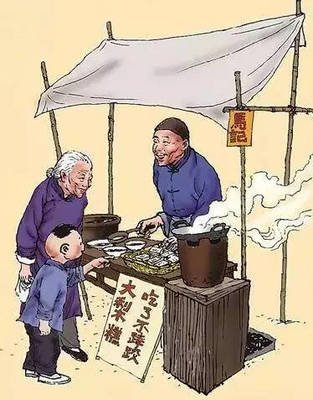How did "bragging" turn into "blow big pear"?
“吹牛”怎么吹成了“吹大梨”
In Tianjin, people refer to "bragging" as "blowing big pear," meaning to exaggerate or not be reliable. What’s the association between "bragging" and "blowing big pear" in the Tianjin dialect? The term "big pear" refers to a beloved and affordable fruit in Tianjin. Additionally, the folk song "Big Rooster" is a traditional Tianjin ballad that reflects local attitudes and customs:
"There’s a big rooster, with long tail, married a wife and forgot his mother.
Mother wants to eat sugar cakes, but has no money.
Wife wants to eat a big sugar pear, so they shopping in the east market, in the west market,
She buys a big sugar pear. Eat it slowly, swallow slowly,
what if the pear core gets stuck?"
In the streets of Tianjin, there is a trade known as "blowing sugar figures." Vendors place malt sugar on a small stove, and when children come to buy, they pull out a small piece of malt sugar, knead it, and then blow it into various shapes in their mouths. One of the easiest shapes to blow is a small round ball. Then they pinch it to resemble a big sugar pear. However, this "big pear" is just a facade, with only a thin layer of sugar that looks good but is not edible. The finished product looks big and sweet, allowing for both eating and playing. However, it is important not to run or go to windy places because, due to its large size and thin skin, a bit of wind can render this "big sugar pear" useless.
Therefore, Tianjin locals directly refer to people who are boastful and exaggerate their words as "big pears," depicting the act of exaggeration with the vivid expression: "blowing big pears". There is a common saying in Tianjin: "Big pears earn money and bewitch", which serves as a reminder not to believe the exaggerated words of those who boast in order to gain wealth. Instead of taking it as a humorous anecdote, it is better to listen with caution, as false claims may be nothing more than "waving hands while sitting in an airplane - deceiving the heavens." Individuals referred to as "big pears" are not worth trusting.
In the fierce competition at the old Tianjin Wei River wharf, to establish oneself, one not only needed strength and real skils, but also needed to be eloquent. "Blowing big pears" was a survival tactic back then. There is a saying in Tianjin, "Talking without practicing is just empty talk; Practicing without talking is foolish. Both practicing and talking is the right way." It seemed that the more extravagantly and convincingly one could blow big pears, the more they could impress and dominate others. By dominating others, one could enjoy exclusive benefits.
People from Tianjin are known for their eloquence and their ability to boast, often exaggerating their words with grandeur. The comedians Ma Sanli and Ma Zhiming's sketch "Opening a Porridge Stand" is a satire and mockery of the art of "blowing big pears" among the people of Tianjin.
(Omit)
To deal with "blowing big pears" people from Tianjin have a clever tactic, which is to occasionally deflate their boasting. For example:
"An old lady getting on the tram—please hold off on blowing (rushing)"
"Big pears are not blown, Mount Tai is not piled, and trains are not pushed."
天津人管“吹牛”叫“吹大梨”,意思是说大话,不靠谱。“吹牛”和“吹大梨”有什么关联呢?
“大梨”是老天津人喜爱的水果,便宜实惠。天津有关民谣《大公鸡》:
“大公鸡,尾巴长,娶了媳妇忘了娘。老娘要吃糖烧饼,没有钱。媳妇要吃大糖梨,东赶集,西赶集,买回一个大糖梨。慢慢吃,慢慢咽,梨核儿卡着怎么办?”
天津街市有“吹糖人”的小买卖,把饴糖放在小火炉上,有小孩来买,抻出一小块饴糖,捏一捏,再放在嘴上把它吹成各种各样的形状;而此中最省力的一种形状,就是把它吹成一个小圆球,然后再捏一下,形状颇像一个大糖梨。但这个“大梨”,毕竟是假的,薄薄一层糖,中看不中吃。吹出来的成品,那“大糖梨”又大又甜,可以边吃边玩。但是千万不能跑,或者去风大的地方。因为它个大,所以皮薄,风大那么一点儿,这个“大糖梨”就报废了。所以,天津人把满嘴跑火车,吹牛自夸的人,直接称为“大梨”,是把言过其实的吹牛行为,形象地叫做“吹大梨”。天津有一句俗语“大梨赚财迷”,是提醒别为了贪财,信了吹牛皮的人讲的大话,只把它当成幽默段子,姑妄听之,说那是“坐飞机摇小手——糊天”、“这小子,大梨,甭信他的”!
在旧时老天津卫码头激烈的竞争中,要想立得住,不但要有实力有真本事,还要能说会道,“吹大梨”在那时是一种生存手段。天津有一句俗语“光说不练,嘴把式;光练不说,傻把式;又练又说,好把式”。似乎谁吹大梨吹得越玄,吹得越圆,谁就能把别人镇住。镇住别人,自己就能吃独食。
天津人能说爱吹,吹起“大梨”来,云山雾罩、口若悬河。马三立马志明的相声《开粥场》就是对“吹大梨”的调侃和讽刺:
甲:您别看地多,收下来的粮食还不够喂牲口哪
乙:您那儿养着多少牛、马、驴、骡呀
甲:我们那儿不养活牛、马、驴、骡
乙:养活什么
甲:养活骆驼。
乙:养活多少个骆驼呀
甲:骆驼不论个儿。
乙:论什么呀
甲:五个为一串儿,六个为一贯儿,七个为一把,八个为一帮。
乙:您是串儿、贯儿、把、帮
甲:我这儿把着哪。
乙:唉
我这儿也没落子
甲:我这儿拴着把子哪
乙:您那儿有多少骆驼呀
甲:我们家养着八千八百八十八把子大骆驼。
乙;又来啦
甲:要说八千八百八十八把子大骆驼,又不够八千八百八十八把子大骆驼
乙:怎么
甲:上山驮煤去了四千四百四十四把子大骆驼,我家后院拴着四千四百四十四把子大 骆驼,共凑一块儿才有八千八百八十八把子大骆驼。
乙:这个比地可好说。
甲:您说说。
乙:您家种着有九千九百……
甲:八千八百。
乙:噢噢
您家种着八千八百八十八把子骆驼。
甲:什么
种骆驼 我哪儿找骆驼种去呀
乙:不不
您家拴着八千八百八十八把子大骆驼。
甲:唉
这还差不多。
乙:要说八千八百八十八把子大骆驼又不够八千八百八十八把大马猴
甲:大马猴
乙:不不
大骆驼。
上山驮煤去了四千五百九十……这您爱有多少有多少吧
对付“吹大梨”,天津人有妙招,就是时不时煞一下他的风景----
“老太太上电车----您了先别吹(催)”
“大梨不是吹的,泰山不是堆的,火车不是推的”。



